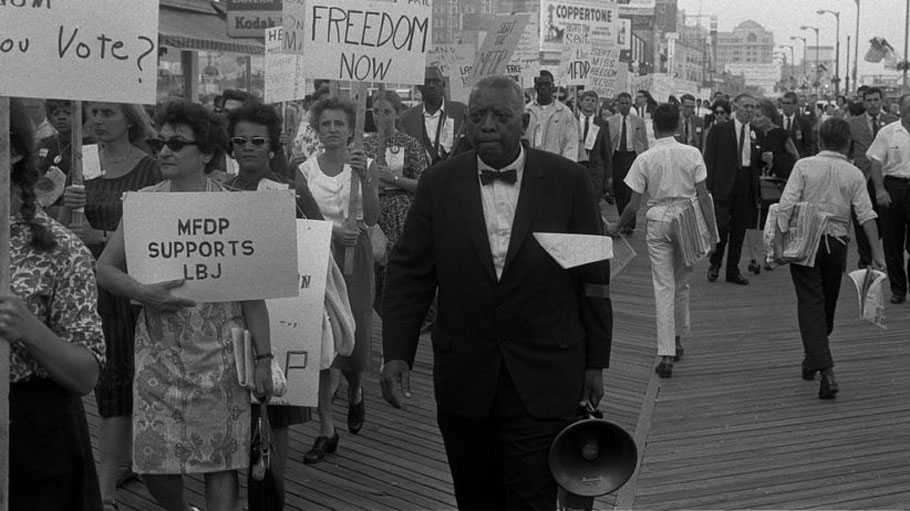Black and white Mississippi Freedom Democratic Party supporters at the 1964 Democratic National Convention march on the boardwalk in Atlantic City, N.J. (Library of Congress)
By Lark Lo —
Black people can critique the Democratic Party and vote. The option isn’t “shut up and smile” or “don’t vote at all.” That is the neoliberal’s stance, not the progressive’s stance.
Progressive black people have not been promoting the boycotting of voting. Instead, they have been asking for their community to question and to demand humanity and dignity from the Democratic Party, a party the black community has shown unwavering loyalty to for over 50 years.
The black community can and must critique the neoliberalism that has engulfed the Democratic Party and has harmed not only black people, but all people in the United States.
According to Investopedia, neoliberalism is:
“A policy model of social studies and economics that transfers control of economic factors to the private sector from the public sector. It takes from the basic principles of neoclassical economics, suggesting that governments must limit subsidies, make reforms to tax law in order to expand the tax base, reduce deficit spending, limit protectionism, and open up markets up to trade. It also seeks to abolish fixed exchange rates, back deregulation, permit private property, and privatize businesses run by the state.
So neoliberalism kills people. Democrats who are invested in neoliberalism are assisting in that activity.
In the U.S., black people work in the public sector disproportionately. The private sector has been notoriously racist and sexist in regard to its relationship with people of color and women. When neoliberals kill the public sector, they kill black jobs. This, in turn, eliminates the black middle class and its ability to build its own institutions. The dominoes fall, defunding black churches and starving black businesses.
And then, when neoliberals take away safety nets by cutting funding, they hurt all people, including black people. Black people have historically been excluded from economic and labor opportunities, and our most economically oppressed communities need those services to stay alive.
Most black people and working-class white people who enjoy the privilege of tenured teaching jobs and steady writing jobs owe their ability to hold those jobs to their parents providing them with access to middle-class opportunities. Those opportunities more often than not were provided to them by their parents’ public-sector jobs and by public-sector services.
State colleges and public schools are public-sector services. Libraries are public-sector services. Public transit is a public service.
If neoliberals had their way, those would be gone or sponsored by Amazon or DeVry University or Uber.
Now these same black people, who are often the only black person at a party, the only black person in their departments, the only black person in their neighborhood, the only black person on a panel about black people, have become the neoliberal whips. In Congress, the role of the whip is to keep the caucus in line. The neoliberal whip has the audacity to turn around and say that progressive black people need to be quiet for the good of the community.
Is the neoliberals’ silencing of the Democratic Party and its actions that affect our community a benefit to the black community?
I find the implication of “beneficial intent” that I read repeatedly from worshippers of the neoliberals’ sacred cow, the Democratic Party, laughable, laugh aloud-able, in fact.
The community does not need black people who have the privilege to wax poetic about the miserable state we are in to wax poetic without mentioning the Democratic Party’s role in the miserable state we are in—and the Democratic Party does have a role.
We need to mention the Democratic Party’s obsession with war and money and power. We need to mention the Democratic Party’s lack of investment in campaigning in the black community, which includes giving minimal amounts of money to black media and black consultants and political campaigns that need black votes.
We need to mention the Democratic Party’s lack of concern in regard to black people in their nonaction and sometimes active support on policies like voter suppression, killing single-payer health care, dismantling rent control, supporting gentrification and archaic drug laws.
Black unemployment did not go down during Barack Obama’s presidency. Why? Is it because black people are not supposed to ask for anything, because the good of the community demands silence?
I do not understand that, and I do not agree with this stance of silence.
Funny how the good of the community seems to involve lifting up only the 2 percent of black people who already have privilege.
Not calling me a racial slur and being OK if your children have sex with me is not good enough. That is not progress. That is Louisiana house slavery compared to Mississippi field slavery. At the end of the day, I’m still a slave.
The black community does not need a party that is socially liberal, but fiscally cruel. The black community needs a party that believes in justice. We need a party that believes in fiscal kindness, fiscal liberalism, and universal access to shelter, health care, and education.
The only way that the black community is going to get a Democratic Party that is about justice and equity is if those who can speak up, do speak up.
We need to speak up and risk our token status. We need to speak up and risk a Democratic Party invite. We need to speak up and risk not getting a certificate that says “good job” and a grant for $10,000.
The many people who say we should smile and vote Democratic and not ask questions like to continuously remind us that our ancestors died, so we would have the right to vote.
That is only minimally correct.
Our ancestors died, so we would have the right to stand up, speak out, and to reach out and help those black people who can’t afford to get on the bus or go to school and never get asked what they think.















